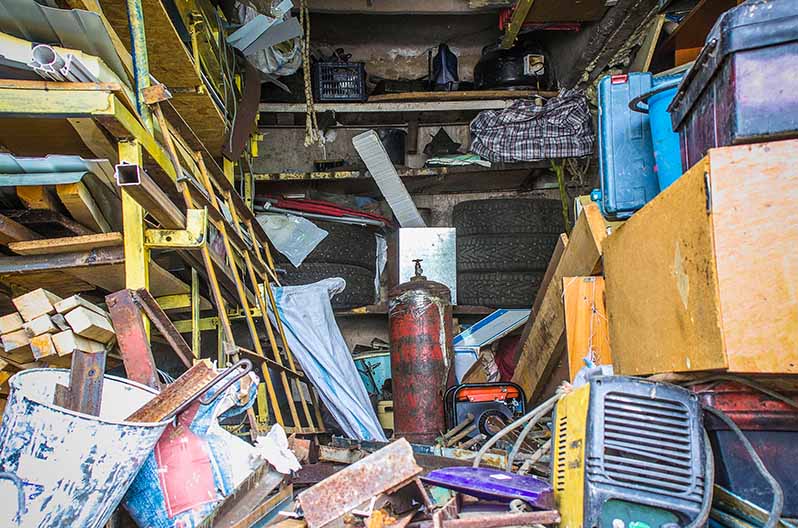While it might seem harmless at first, hoarding is a mental health disorder that can lead to several severe safety hazards and physical health risks. It can also disrupt both personal relationships and work. When left untreated, a hoarding problem will usually escalate. Whether you are concerned about yourself or a loved one, here is how you can spot the 5 stages of hoarding.
What Are the 5 Stages of Hoarding?
Level One: Mild Clutter
The first stage of hoarding is frequent but mild clutter. However, it poses no significant health concerns. Despite the disorganization, they clean up regularly. Common signs of stage one hoarding include:
- Disorganized Clutter in Some Areas
- All Doors, Stairways, and Windows Are Usable
- Good Ventilation Throughout the Home
- No Odors or Mold
Although most individuals can change their behavior with group therapy in the first stage of hoarding, the disorder can decline without help. However, level one hoarding does not need specialized cleanup services.
Level Two: Moderate Clutter With Declining Hygiene
Clutter increases in the second stage of hoarding and may block seating areas or walkways. These individuals clean infrequently and may seem unaware of the problem or risks. They are usually less social and avoid having guests over. The signs of the second stage of hoarding include:
- Mild to Moderate Clutter in Most Rooms
- Clutter Blocks At Least One Exit or Accessway
- Inconsistent Ventilation
- Moderate Build-Up of Garbage, Dirty Dishes, and Laundry
- More Pets That Are Safe for the Size of the Home
- Possible Pet Excrement on the floor
- Mild to Moderate Odors
- Potential Risk of Mold
Individuals at this stage might need personalized therapy to help with their hoarding behavior. While professional cleaning services are helpful, they are not always required.
Level Three: Significant Clutter With Unhygienic Conditions
Significant clutter with unhygienic conditions is the third stage of hoarding. The clutter limits access throughout the home, often making one room unusable. It’s difficult to tell what is clean from what is dirty, and bug infestations are common. While the clutter is overwhelming from an outsider’s perspective, the individual is often unaware of their situation. Additionally, many hoarders at this stage are reclusive. Signs of a level three hoarding problem include:
- Significant Clutter and Filth Throughout the Home
- Clutter Blocks, Walkways, Stairs, and Doorways
- Very Poor Ventilation
- An Unreasonable Number of Pets in the Home
- Some Pet Excrement on the floor
- Intense Odors
- Some Mold, Usually in Kitchens and Bathrooms
- Mild to Moderate Ant and Cockroach Infestations
By level three, the individual requires specialized mental health assistance to deal with these compulsions. Most regular cleaning companies will not accept the job due to the unsanitary conditions. Because of the health risks, only specialized biohazard cleanup specialists are equipt to handle the situation.
Level Four: Extreme Clutter With Unsanitary Conditions
By stage four, the home poses a significant health risk. Clutter and garbage fill the entire house. There is usually rotting or expired food left out, which attracts insects and rodents. Pets are neglected and in poor health. The individual is often anxious or agitated when talking about cleaning up or getting help. Mold and water damage can lead to minor or even moderate structural damage. The signs of a level four hoarding problem include:
- Pervasive Clutter and Garbage Throughout the Home
- Little to No Ventilation
- Extreme Odors
- Excessive Pets, Often in Poor Health
- Extensive Pet Excrement on the floor
- Expired and Rotting Food on the counter
- Mild to Moderate Mold and Water Damage Problems
- Significant Bug and Rodent Infestations
- Appliances May Not Work
- Minor to Moderate Structural Damage
At this stage of hoarding, the individual will need a team of qualified experts to help with their disorder. In addition to specialized mental health experts, many individuals also need help from social workers or financial counselors. Only certified biohazard cleaners should attempt to clean up their property.
Level Five: Unsanitary and Structurally Unsafe Living Conditions
By stage 5 of hoarding, it is usually no longer safe to live in the home due to the unsanitary conditions. Pets typically have diseases that may pose a risk to humans. There are pervasive problems with mold, water damage, bugs, and rodents throughout the home. Interior and exterior structural problems make the home unsafe. In many cases, the utility company has already shut off the water and power. Visible signs of a stage 5 hoarding problem include:
- Clutter and Garbage Make Living Areas Unusable
- No Ventilation
- Extreme Odors, Mold, and Water Damage
- Extensive Bugs and Rodents Infestations
- Sick or Diseased Pets Pose a Risk to Humans
- Disconnected Electricity or Water
- Significant Interior or Exterior Structural Damage
Level five hoarding is a serious mental health condition. At this stage, individuals need extensive professional assistance. Due to the risk of mold and bacteria, only fully licensed biohazard contractors should clean up the damage.
If you or a loved one needs hoarding cleanup, Restoration Local is here to help. Our biohazard specialists are trained and experienced in cleaning and restoring homes with stage three and above hoarding problems. Call 888-790-7879 now for your no-risk free quote.





